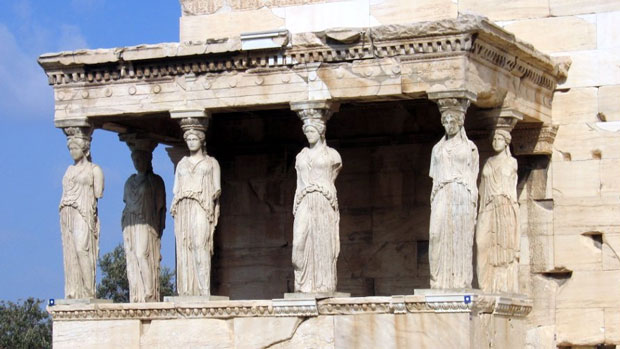I read a story about a young Greek maiden who was elegant and beautiful beyond belief, like Helen of Troy, and was admired by all that laid eyes upon her. People would comment how graceful, refined, and proud she was, yet she was humble and showed humility to the people of the town. She knew that her beauty and charm was God-given but it was the town and the people in it that made her what she was. She loved them and they loved her. She would never leave her home, especially because of her five other sisters, which, to the amazement of the people, were just as beautiful and charming. It was said that it was as if a sculptor had chiseled all six sisters from the same piece of marble.
One day a dashing young rich European aristocrat came to town. He was well-groomed, a gentlemen, and dressed the part. He told the townspeople stories of his military exploits and how he had traveled the world. He enchanted them all, but, as with all other travelers that came through the town, he too had fallen in love with it and everything in it, but more for the young Greek maiden. Soon his time there would end but he could not leave behind that which he had fallen in love with so he began telling the people that their town was in danger and how he could protect the town, especially the young Greek maiden. He smooth talked his way into her life and before anyone knew it, whisked her away, never to see her sisters and the town again.
The young Greek maiden, use to living in the bright, warmth of the Greek sun, gazing upon the clear blue waters of the Aegean, now lived in a dark, damp castle with the aristocrat. Passersby stared at her and although they saw her beauty, they had no warmth for her. Each day she cried to go home and each day the young aristocrat told her that this was now her home and he had taken her here to protect her. Unlike Helen of Troy, who loved her abductor, Paris, the young Greek maiden did not love her abductor. She despised him. Neither did she have a Menelaus and Agamemnon who sent a thousand ships and the legendary heroes of Ancient Greece to fight for her return. She was alone and with each passing day she never forgot her home and she kept a flicker of hope that someday, her Greeks would rescue her and bring her back in her homeland.
Sad story, isn’t it? But it is true.
Starting in 1801 and ending in 1812, our young aristocrat, Thomas Bruce, 7th Earl of Elgin (Lord Elgin), Ambassador Extraordinary and Minister Plenipotentiary of His Britannic Majesty for the Sublime Porte of Selim III, Sultan of Ottoman Empire, which included Greece, removed sculptures, metope panels, and other objects from the Parthenon and the surrounding temples, including our young Greek maiden, one of the caryatids (a sculpted female figure serving as an architectural support taking the place of a column), from the Erechtheum built between 420-415 BC. He left the other five caryatids behind.
From Greece, Lord Elgin brought the young Greek maiden and all the other sculptures and items, now known as the “Elgin Marbles,” to England and tried to sell them to the British government. They initially declined but in 1816 the House of Commons offered £35,000 and purchased them. They were placed in the British Museum and in 1939, the Duveen Gallery was completed, setting record attendance for the Museum. The Elgin Marbles remain there today.
Greece has demanded the return of the Elgin Marbles. The English have refused. The Greeks argue that all of the Parthenon’s sculptures should be reunited, that they are part of a single work that should be seen together, that they would be protected in the new Acropolis Museum, that other countries have returned similar items, and that the marbles were obtained illegally.
Britain has argued that the Parthenon cannot be restored so what difference does it make if they are viewed at the British Museum as opposed to the Acropolis Museum, that Lord Elgin and the British saved the marbles from ruin and destruction, that the marbles are of “global” significance not just Greek and should be seen around the world, and, they were obtained legally.
So many arguments back and forth. So many polls taken, petitions signed, accusations made… but our young Greek maiden still remains alone away from her sisters and her homeland. What is the bottom line? Let’s be honest. It’s not protection of ancient artifacts. It’s not the “global” significance of the marbles. And it certainly is not whether the marbles were taken legally or illegally. It’s money, prestige, and arrogance… plain and simple.
The British Museum and others throughout Britain make money from showcasing these artifacts. It’s prestigious to have these ancient artifacts in their museums so they can obtain other artifacts. It’s arrogance that only the British can “protect” these artifacts.
I agree that there is a case made that during Great Britain’s history of colonialism, invasions, and occupation of foreign lands, and their removal of artifacts from these conquered lands, they actually safeguarded these objects, albeit unknowingly, but this is no longer the 18th and 19th centuries. Times have changed and it is the arrogance of Britain to think that the countries from which these artifacts were taken from cannot safeguard them anymore and that Britain is the center of the universe.
The Greeks are not the only ones demanding return of its historical property. Egypt is looking for the return of the Rosetta Stone and other Egyptian artifacts from Britain. Turkey had demanded the return of a 14th century BC Uluburun ship, the world’s oldest recovered wreck from the British Museum. India has also demanded the British Museum for the return of its artifacts taken during the British occupation. And the list goes on and the British continue to refuse… arrogance.
What the British government has done is so outrageous that a new word has been created. “Elginism… an act of cultural vandalism.”
Put aside all the arguments about protection, global history, legality of ownership, etc. It’s time for Great Britain to do the right thing. Show the world that you do care. Return the young Greek maiden and the Elgin Marbles and let them come home to Greece.
George Clooney, Bill Murray, and Matt Damon are for… why not you!



